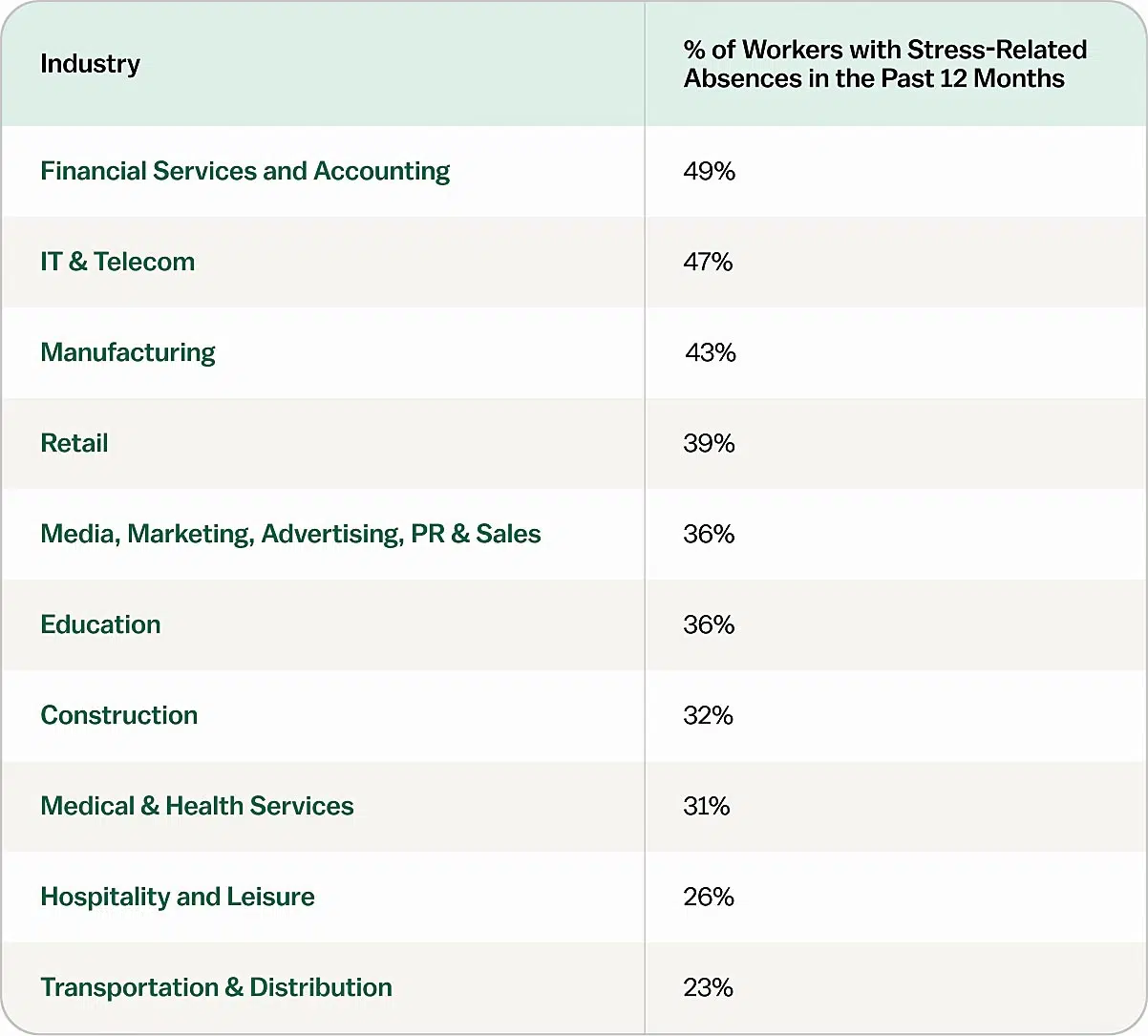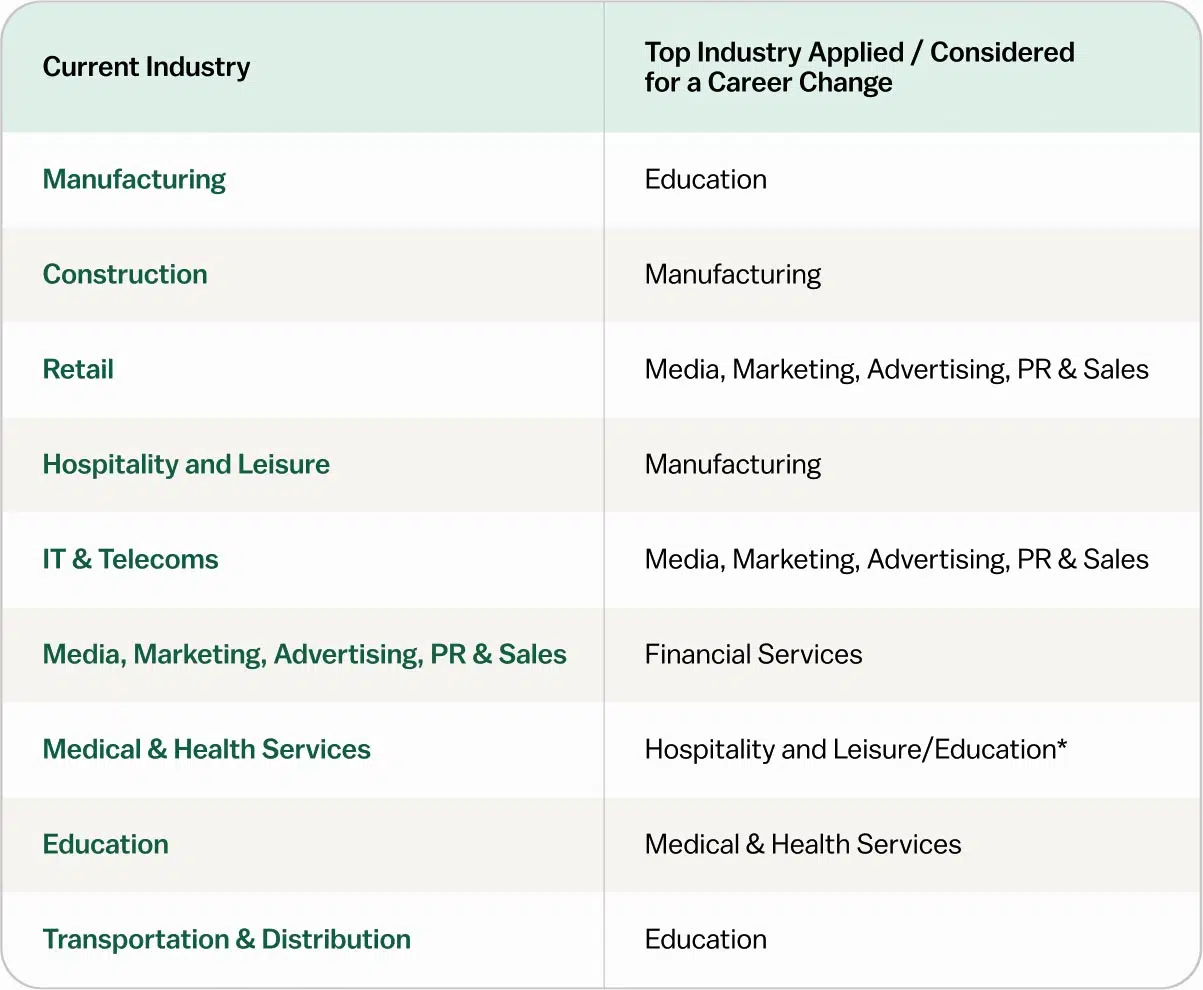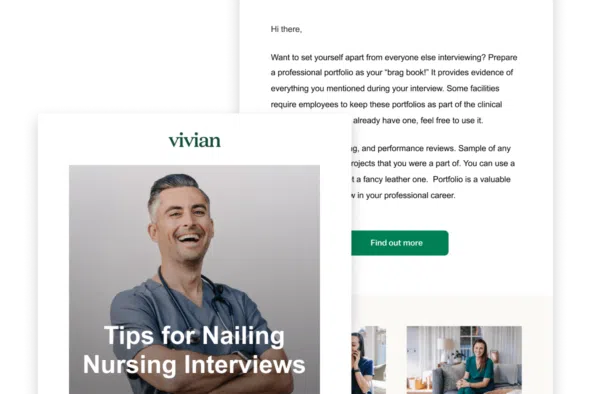Feeling stressed in your job? You’re not alone. We recently surveyed over 1,000 U.S. workers across a range of industries to ask how stressful they perceived their job to be. A staggering 48% of respondents reported their jobs as stressful, with 50% considering or actively applying for a new role in a new industry within the last year. And leading the list of most stressful industries? Healthcare.
To understand the state of the healthcare industry, we’ve taken a deep dive into our survey results to understand the impact of work-related stress and discover top tips from experts on how best to recognize and reduce workplace stress.
Industries Experiencing the Most Work-Related Stress
We asked respondents what industry they worked in and to rate how stressful it was on a scale of 0-10, 10 being very stressful.
Our survey results indicated that healthcare was the most stressful industry, taking the top spot with the highest average stress rating across all responses.
The top 10 most stressful industries per survey respondents included:
- Medical & Health Services
- Financial Services and Accounting
- IT & Telecom
- Hospitality and Leisure
- Education
- Media, Marketing, Advertising, PR & Sales
- Manufacturing
- Retail
- Transportation & Distribution
- Construction
When asked how stressful they perceive healthcare jobs to be, close to three-quarters (73%) of respondents said they perceived healthcare to be a stressful industry, regardless of the industry in which they worked. While this may not surprise nurses and allied health professionals, it’s interesting to note how people in other occupations view stress in healthcare on a professional level.
No industry’s workers perceived their jobs to be more stressful than jobs in the healthcare industry. In fact, respondents not working in healthcare viewed it as a more stressful industry than the medical professionals actually working in the industry.

Industries with the Most Stress-Related Work Absences
According to the World Health Organization, work-related stress is the human response and reaction when presented with work demands and pressures that “aren’t matched to their knowledge and abilities and which challenge their ability to cope.”
Despite being rated the most stressful industry, our survey results revealed that medical and health professionals have lower rates of stress-related absences than those working within other industries. For example, 49% of workers in financial services and accounting took stress-related absences compared to 31% of medical and health service employees. Furthermore, just under half (47%) of those working in IT and telecom jobs have taken a stress-related absence in the past 12 months.
Our survey results also showed that work-related days off were more common in younger generations across a range of industries. While only 25% of workers aged 45 to 54 took stress-related sick days in the past year, 52% of those between the ages of 25 and 34 took a stress-related absence in the same period.
The industries with the most stress-related absences over the last 12 months, according to our survey, can be seen in the table below.

In the journal article “Supporting Healthcare Workers With Work-Related Stress,” doctors revealed that work-related stress is also a significant problem in the UK healthcare system. They believe healthcare workers may experience guilt or shame due to stigma, preventing them from seeking help if they experience work-related mental illness. They deduced that time off work and changes in the workplace to control the triggers may be necessary to allow recovery and a sustainable return to work.
With this in mind, healthcare staff may take fewer sick days due to a greater sense of responsibility for their patients and a perceived stigma for stress-related sickness within the industry. The reason could also be related to staff shortages that can put hospitals at risk if healthcare workers choose to take sick days, potentially increasing burnout and employee turnover.

How Occupational Stress Is Reshaping The Employment Market
To understand the current state of the employment market, we asked survey respondents if they had considered or applied for work in an alternative industry in the last 12 months. Half of the respondents said they had. The top industries where respondents were considering a career change were the education sector and marketing.
We analyzed the results to see which industries respondents had considered swapping for their current industries. You can see the results in the table below.

* other/unspecified industries excl.
The demands and stress in the healthcare industry often cause nurses and other medical professionals to regularly experience emotional burnout, moral injury, anxiety, stress and even physical burnout. Work-related stress can stem from dealing with difficult patients and family members, lack of supplies and/or resources, traumatic experiences and workforce shortages. All of which are common occurrences in the healthcare industry.
How to Recognize Signs of Stress and Burnout: The Five Stages
The American Institute of Stress determines stress as a major cause of 80% of all occupational work injuries, but how do you recognize when stress levels have become unhealthy?
Signs of stress and burnout aren’t always as easy to recognize as you might think. Spotting the warning signs of work-related pressure and burnout early can be vital in stopping stress from taking over and finding new ways to manage it. Learning the symptoms you might experience if you’re not coping well at work is also crucial.
The Freudenberger model has been simplified and often used to measure the extent of the effects caused by stress and burnout. It’s a useful way to individually monitor your feelings and recognize the symptoms you’re experiencing earlier to help find ways to cope.
Stage 1
This is a healthy “honeymoon” stage, where workers will have high productivity levels and experience job satisfaction.
Stage 2
If you’re experiencing increased feelings of irritability, are less patient with those around you and have reduced sleep quality and are struggling to focus at work, there’s a good chance you’re experiencing the onset of stress, stage 2 of burnout.
Stage 3
Stage 3 is the chronic stress stage. When you hit this stage, you’re experiencing persistent tiredness, procrastinating from priorities, feeling overwhelmed with pressure and withdrawing socially from those you work with and people outside of work.
Stage 4
This stage is the burnout stage. If you find that you’re catching more bugs, getting an upset stomach often or experiencing regular headaches, this is probably the stage you’re at as your body sends you physical cues trying to tell you that you need to slow down. You may feel pessimistic and be neglecting your own personal needs, as well as those around you.
Stage 5
The final stage of the model is habitual burnout. Stage 5 is when you may experience chronic sadness, mental fatigue and depression.
How to Reduce Stress in Healthcare

Despite the individual methods of self-care you can implement, the results of our survey show burnout in healthcare workers is much more than an individual issue. So, what needs to be done to improve the current circumstances?
In the New England Journal of Medicine, Vivek H. Murphy, MD, MBA, discussed his perspective on confronting health worker burnout and increasing well-being within the industry. According to him, causes of extreme stress in healthcare go beyond the long hours and the obscure shift patterns and include lack of support, demanding workloads and administrative burdens, chronic underinvestment in public health infrastructure and moral distress from being unable to provide the care patients need.
In 2022, Dr. Murphy’s Surgeon General’s Advisory on health worker burnout and well-being called for making some of the following steps to have a positive impact on stress levels in healthcare workers across America.
1. Prioritize Healthcare Worker Protection
He believes added value and protections must be in place for doctors, nurses and all workers in healthcare. These include ensuring they receive living wages, access to health insurance and adequate sick leave. Again, as revealed by Vivian Health’s survey, health workers aren’t currently utilizing sick leave much. These protections can also include pay transparency, which many health systems across the nation still don’t prioritize.
2. Reduce Administration Demands
Currently, studies find that outpatient physicians spend 2 hours at their desks for every 1 hour spent with patients. The healthcare industry should streamline paperwork, simplify billing forms and adopt greater reliance on technology to optimize workflow and communication systems to remove barriers between health workers and patients.
3. Improve Mental Health Care
According to Dr. Murphy, increasing accessibility to mental health care virtually and around shift patterns should be a priority across America. Expanding the mental health workforce is also crucial, as health workers are having difficulties getting mental health care.
Creating a Culture of Well-Being

According to the National Center for Chronic Disease Prevention and Health Promotion, managers and supervisors play a significant role in reducing and preventing work-related stress. Creating a culture focused on the well-being of healthcare workers, implementing institution-wide policies and introducing additional training and employee assistance programs should encourage employees to be more vocal and communicate their feelings when they’re feeling overwhelmed.
If you’re seeking more ways to cope with work-related stress in healthcare, the team at Vivian Health has put together supportive tips on reducing your pre-shift anxiety to allow you to nip the earlier stage feelings of anxiety and discontent towards work in the bud and avoid progression into more chronic stages of stress.
Take the stress out of your next job search, browse our current job opportunities in staff, travel, per diem and local contract positions, and let us help you take your career to the next level.
© Vivian Health 2023









